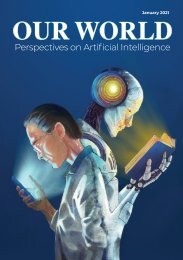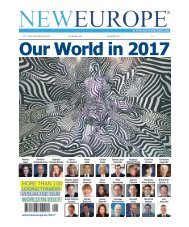Our World in 2018
Leading minds reflect on the state of our societies, and examine the challenges that lie ahead. An edition dedicated to generating ideas that will help form a new vision for our world.
Leading minds reflect on the state of our societies, and examine the challenges that lie ahead. An edition dedicated to generating ideas that will help form a new vision for our world.
You also want an ePaper? Increase the reach of your titles
YUMPU automatically turns print PDFs into web optimized ePapers that Google loves.
SCIENCE & TECHNOLOGY
Is this the end
of the era of
science?
By Dr Rick Phillips
It is commonly said that those who do not
learn from history are doomed to repeat
it. In 1633, Galileo was tried and convicted
for his support of the theory that the Earth
revolves around the Sun. This theory, which
Galileo came to support as a result of his
the planets and moons in our solar system,
contradicted the doctrine of the day, which
said that humanity, and by extension the
Earth, stood at the centre of the universe.
After being found guilty, Galileo was placed
under house arrest until his death in 1642.
Thankfully, our attitudes towards science
and scientists are a little bit more enlightened
in 2018. Just as we stopped burning witches,
sacrificing animals and killing heretics, so
too did we stop persecuting scientists for
reporting facts about the natural world.
Indeed, most people nowadays believe
science is a force for good, which makes
many aspects of our lives easier and more
pleasant. However, we would be wise to learn
the lessons from how science was misused
in the past, lest we inadvertently end up
repeating them.
Policymakers in particular should be
careful to heed these lessons. Too often,
scientific evidence is ignored or distorted
by politicians for electoral purposes, and
a lack of transparency allows lawmakers
a politically favoured result. In the EU, this
problem is epitomised by the Comitology
process. Comitology is the mechanism for
passing secondary EU legislation, an outdated
and opaque procedure that has been badly
Dr Rick
Phillips
Dr Rick Phillips is the
president and CEO
of Anitox, a global
leader in the control
of pathogens. He is a
poultry veterinarian.
year, and, if left unchecked, will seriously
undermine the status of science in the EU
for years to come.
A perfect example of this dysfunctional
system in action was in the Commission’s
recent handling of the authorisation of
formaldehyde in animal feed. People may
balk at “formaldehyde” as a scary chemical,
but in fact it is a highly useful substance,
especially for treating the dangerous
Salmonella bacteria. Often in science we
deal with substances and chemicals which
can be dangerous, but we all know how
useful substances such as bleach and petrol
can be safe as long as they’re used correctly.
Formaldehyde is naturally present in both
animal and plant cells. The science around
formaldehyde is likewise unambiguous: it is
the best treatment for Salmonella in animal
feed, and when used correctly poses no risk
to workers or consumers.
You shouldn’t just take my word for it: take a
C.
The Commission’s food safety authority,
EFSA, found that the use of formaldehyde
in feed poses no risk to consumers. The
Commission’s body responsible for workers’
safety in handling chemicals, SCOEL, set
safe exposure levels for workers using
formaldehyde. These limits have been
incorporated into the Commission’s draft
revision of the Carcinogens and Mutagens
at work Directive, the canonical piece of
legislation protecting workers from exposure
to carcinogens or mutagens in the workplace
in the EU.
Equipped with this scientific evidence,
the Commission backed a full 10 year
authorisation when formaldehyde’s
authorisation came up for renewal in 2014.
However, in the face of opposition from a
small number of member states who did not
use the product, and who wanted it removed
for partisan reasons, the Commission was
favour of the proposal.
Discussions on the proposal lasted almost
three years with no resolution. During
this time Poland denied authorisation of
88 2018 | OUR WORLD










